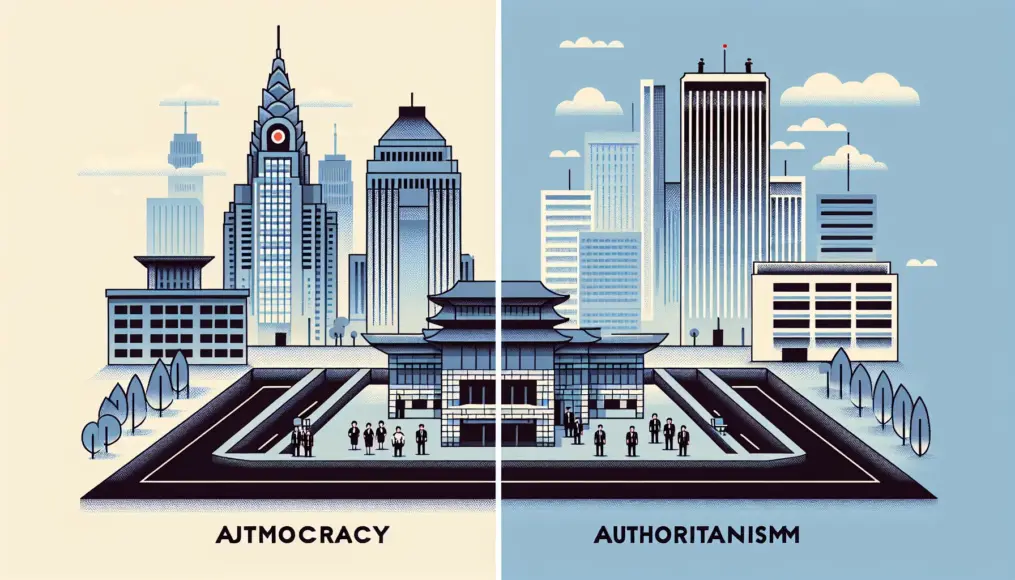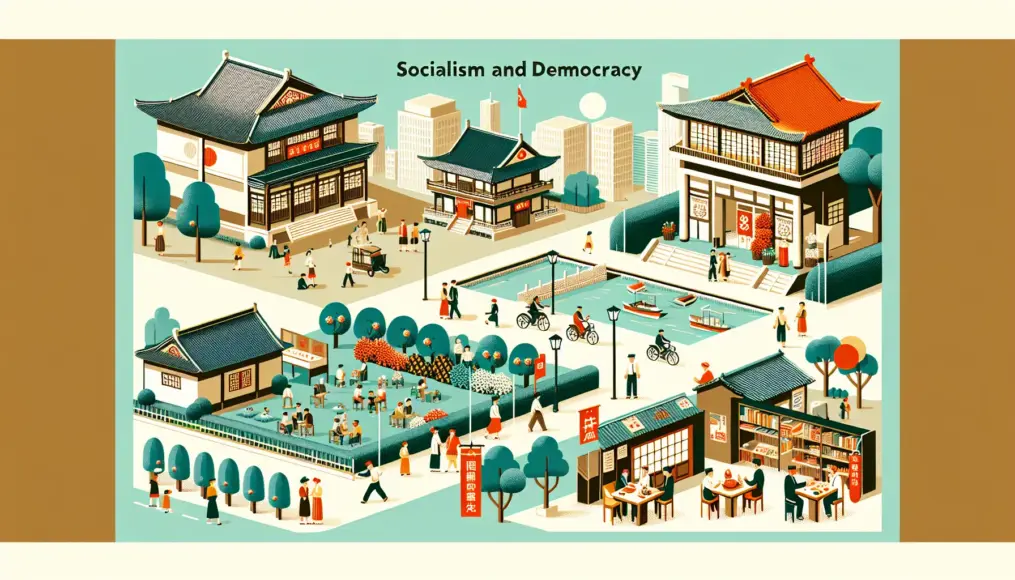Authoritarian regimes represent a significant theme that profoundly shapes our social and political landscapes. At times, those in power wield considerable influence, often ignoring the voices of ordinary citizens. By examining how these systems form and the effects they have, we can gain valuable insights into our future.
In this article, we will delve into the characteristics of authoritarian regimes, their historical backgrounds, and philosophical critiques to better understand their impact on contemporary society. Join us as we explore how these systems intertwine with our lives and values.
- An explanation of the fundamental characteristics of authoritarian regimes and how they differ from other political systems
- A look back at the evolution of authoritarianism and significant historical events
- An exploration of the influence of authoritarianism in modern society and its relationship with democracy
What is Authoritarianism?
Authoritarianism refers to a political system where power is concentrated in the hands of specific individuals or groups, often at the expense of the opinions and rights of ordinary citizens. In such systems, those in power wield significant influence, and there are frequently restrictions on free elections and freedom of speech. Historically, authoritarian political regimes have been observed in many countries, and their impacts continue to resonate in today’s societies.
In this section, we will explore the fundamental characteristics of authoritarianism and compare it with other political systems. By understanding how power is exercised and the effects it has on citizens’ lives and society as a whole, we can gain insight into the essence of authoritarian regimes.
Key Characteristics
The key feature of an authoritarian system is the concentration of power among a select few, leading to the exclusion of alternative opinions and perspectives. In these regimes, the government often imposes stringent laws and regulations that limit citizens’ actions, and dissenters may face repression. Under authoritarianism, information is tightly controlled, and media is censored, making it difficult for the populace to access accurate information.
Moreover, those in power often prioritize their own interests, frequently disregarding the public good. This situation can exacerbate social inequalities and serve as a catalyst for political conflict.
- Concentration of power among specific individuals or groups
- Restrictions on free elections and freedom of speech
- Control of information and censorship of the media
Comparing Authoritarianism with Other Political Systems
When compared to other political systems, authoritarianism presents several key differences. For instance, in a democratic system, citizens have the right to choose their government through elections and can express their opinions freely. In contrast, authoritarian regimes often limit such rights, and criticism of the government is frequently suppressed.
Additionally, authoritarianism is sometimes confused with totalitarianism, which demands even stricter control and regulation. While authoritarianism does not necessarily govern every aspect of citizens’ lives, allowing for some degree of personal freedom, it does significantly restrict political liberties—a point where the two systems overlap.
To deepen our understanding of authoritarianism, it is also important to consider its relationship with other political systems. If you’re particularly interested in how the separation of powers supports democracy, you might find this article on Understanding the Separation of Powers: Its Impact on Modern Society useful. This article provides a detailed explanation of the fundamental concepts of the separation of powers and its implications.
- Differences between authoritarian and democratic systems
- Comparison of authoritarianism and totalitarianism
- Variations in political impacts on citizens’ lives
The Historical Background of Authoritarianism
Authoritarian regimes are not merely contemporary phenomena; they represent a political system that has evolved from ancient times to the modern era. The concentration of power and the restriction of citizens’ rights have developed within various social and economic contexts throughout history. In this section, we will explore the origins and evolution of authoritarianism to understand how we arrived at today’s authoritarian systems.
By understanding the historical background, we can also touch upon the deep-rooted factors that contribute to authoritarianism and the significant events influenced by it. This knowledge serves as a key to comprehending the nature of power in modern society and how it has transformed over time.
Evolution from Ancient to Modern Times
The roots of authoritarianism can be traced back to ancient civilizations. Notably, in Ancient Egypt and the Roman Empire, there were monarchs and emperors who wielded absolute power, shaping every facet of politics and society according to their will. These regimes were sustained by formidable military forces and religious authority, leaving little room for the freedoms of ordinary citizens.
From the medieval period to modern times, while feudal systems and absolute monarchies retained authoritarian elements, there was a gradual acknowledgment of citizens’ rights. However, with the advent of modernity, revolutions and wars gave rise to new authoritarian regimes, whose influences persist even today. The totalitarian regimes of the 20th century are particularly well-known as extreme forms of authoritarianism.
- The power structures of Ancient Egypt and the Roman Empire
- The evolution of authoritarian regimes from the Middle Ages to modern times
- The impact of 20th-century totalitarian regimes
Key Historical Events
The history of authoritarianism is intertwined with several pivotal events. For instance, the French and Russian Revolutions emerged as attempts to transition towards democracy in response to authoritarian regimes. Yet, ironically, these revolutions sometimes paved the way for the rise of subsequent authoritarian systems. These events illustrate the profound impact that the concentration of power can have on society.
Furthermore, during the Cold War following World War II, various countries established authoritarian regimes. Often, these regimes justified the restriction of civil liberties in the name of national security and economic development. Thus, historical events have played a significant role in shaping and transforming authoritarian systems.
If you’re intrigued by the historical background of authoritarianism, you might also enjoy this article: “What Impact Does Montesquieu’s Separation of Powers Have on Modern Society?”. This piece delves into the principles of separation of powers that underpin democracy, contrasting sharply with authoritarianism. It explores the historical context and its relevance today, helping to clarify how the distribution of power can support societal stability.
- The effects of the French and Russian Revolutions
- Authoritarianism during the Cold War post-World War II
- The concentration of power and the restriction of civil liberties
A Philosophical Perspective on Authoritarianism
To truly understand authoritarian regimes, it’s essential to look through the lens of political philosophy. This field delves deeply into the legitimacy of power, individual freedoms, and the structure of society. Exploring how authoritarianism relates to these fundamental concepts is crucial for grasping our political and social values.
In this section, we will introduce key concepts from political philosophy and consider the philosophical critiques of authoritarianism, examining its issues and limitations. By discussing how the exercise of power is theoretically justified and addressing counterarguments, we aim to provide a deeper understanding of authoritarianism.
Key Concepts in Political Philosophy
Political philosophy encompasses several fundamental concepts, including “power,” “freedom,” and “justice.” Power refers to the ability of individuals or groups to influence others, forming the backbone of any political system. Freedom represents the right of individuals to act according to their own will, positioning it at the heart of democratic values. Justice is a pivotal concept when considering fairness and ethics within society.
In authoritarian regimes, these concepts are often distorted. The concentration of power frequently leads to restrictions on individual freedoms and a compromise in justice. Political philosophy serves as a powerful tool for examining how these core concepts are impacted under authoritarian rule.
- Understanding the fundamental concepts of power, freedom, and justice
- The concentration of power and restriction of freedom in authoritarian regimes
- Political philosophy as a means to analyze authoritarianism
Philosophical Critiques of Authoritarianism
Philosophical critiques of authoritarianism have been raised by numerous thinkers throughout history. They have questioned the legitimacy of power and the rights of citizens, highlighting the limitations of authoritarianism. For instance, philosophers like John Locke and Jean-Jacques Rousseau argued that individual freedom and democratic participation are the foundations of society.
Contemporary philosophers continue to hold critical views on authoritarianism as well. They emphasize how it infringes upon human dignity and freedoms, promoting ideas that prioritize democratic values and citizens’ rights. These critiques play a vital role in fostering resistance and transformative movements against authoritarian regimes.
- Philosophers’ critiques of authoritarianism
- The importance of individual freedom and democratic participation
- Contemporary philosophical criticism of authoritarianism
The Impact of Authoritarian Regimes on Modern Society
Authoritarian regimes continue to exert a significant influence on contemporary society. Their existence is a crucial factor affecting not only economic and social structures but also the development of democracy. In this section, we will explore how authoritarianism impacts the economy and society, as well as its interplay with democratic systems.
While authoritarian regimes can contribute to economic growth and social stability, they can also restrict free markets and citizens’ rights. Understanding these effects is essential for grasping the dynamics of power in today’s world.
Economic and Social Impacts
Authoritarian regimes can have a direct impact on the economy. Some authoritarian governments adopt strong, centralized economic policies that can lead to rapid economic growth in the short term. In such systems, the government manages resource allocation and nurtures specific industries, which can stimulate economic advancement.
However, authoritarianism carries significant risks as well. Restrictions on market freedom may stifle innovation and threaten the sustainability of the economy. Additionally, social inequalities can widen, often creating a stark divide between the powerful and ordinary citizens. These economic impacts can, in turn, affect the overall stability of society.
- Potential for short-term growth through centralized economic policies
- Stagnation of innovation due to restrictions on market freedom
- Risks of economic inequality threatening social stability
Interplay with Democracy
The relationship between authoritarian regimes and democracy is complex. Authoritarian governments often limit democratic processes and tend to disregard the opinions of citizens and elections. In such contexts, the values of democracy can be undermined, leading to intensified political conflict.
On the flip side, the persistence of authoritarian regimes can also rekindle the recognition of democracy’s necessity. As citizens increasingly demand their rights and freedoms, resistance to authoritarianism may arise, ultimately fostering the development of democratic governance. In this way, authoritarianism and democracy interact with each other, shaping the political landscape of modern society.
For those looking to deepen their understanding of the impacts of authoritarian regimes on the economy and society, we recommend the article “What is Conservatism? Its History and Modern-Day Influence.” This piece provides a detailed exploration of conservatism’s historical context and its implications for contemporary society, making it especially relevant in considering the connections to authoritarianism.
- Limitations on democratic processes imposed by authoritarian governments
- The importance of movements advocating for citizens’ rights and freedoms
- Social changes driven by the interplay between authoritarianism and democracy
Summary
Authoritarian regimes concentrate political power in the hands of specific individuals or groups, often at the expense of citizens’ freedoms and rights. This form of governance has evolved throughout history, from ancient times to the present, profoundly impacting the economy, society, and even democracy itself. By exploring the characteristics, historical context, philosophical perspectives, and contemporary implications of authoritarianism, we can gain a deeper understanding of this complex political system.
While authoritarian regimes can bring about economic growth and social stability, they also raise significant concerns regarding freedom and justice. The interplay between authoritarianism and democracy is a crucial factor that shapes the political dynamics in modern society. By adopting this perspective, we can enhance our understanding of authoritarianism and chart a path toward a better society.
- Understanding the characteristics and impacts of authoritarian regimes is essential
- Balancing economic growth with limitations on freedom poses a challenge
- The interaction between authoritarianism and democracy influences contemporary politics
Deepening our understanding of authoritarian regimes is vital as we contemplate our future. We welcome your thoughts and feedback on this article—please feel free to share your comments!



Comment